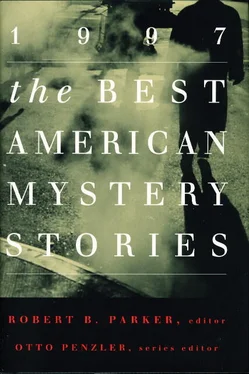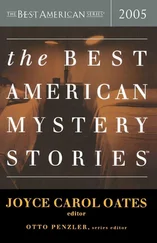I put Diana Poole in the middle of a tented Hollywood party, created some guests, and the story almost wrote itself. When I realized that the story was really a long confession, I knew I would need a device to keep the tension and the suspense going. So I gave the party guests an almost phobic concern about the character Robin’s singing. What didn’t they want to hear? And what would happen if Robin did sing? While the questions regarding the murder are answered early in the story. I let these unanswered questions linger until the end.
I loved writing this story And I’m glad the rock-and-roll star didn’t arrive on time. Because if he had, well, who knows? I hope to group the Diana Poole stories together someday. When I do. I’ll put them on the shelf next to Pat Hobby, who is still trying to sneak onto the studio lot.
Pat Jordanis a freelance writer living in Ft. Lauderdale. He is the author of hundreds of magazine articles (New York Times Magazine, C.Q., Playboy, Men’s Journal, L.A. Times Magazine, Life, etc.) and nine books. This story, “The Mark,” is only the second short story he’s ever written. The first, “Bobby2” was published in November 1992.
• Sol, not his real name, was the best man at my wedding in January 1992. He was serving out the last six months of his six-year marijuana smuggling conviction at a halfway house for felons in Dania, Florida. I had to pick him up on the day of the wedding and return him to the halfway house a few hours later. He missed the reception. That part of “The Mark” is true. The rest is fiction. Sol is a little annoyed at the fiction part of the story. He thinks the story should have more accurately portrayed him as a heroic “Don Juan type of guy,” rather than as “comic relief.” Alas, you can’t please everyone.
I am grateful, however, that I have been able to please Alice K. Turner, Playboy’s fiction editor, who ran the third story about Bobby, Sheila, and Sol this summer. She has encouraged me at every step to pursue these characters and is a willing and enthusiastic reader of each adventure I send her. All she demands of me is that I tell a good story.
Trained as a child clinical psychologist, clinical associate professor of pediatrics at USC School of Medicine, Jonathan Kellermanis the author of twelve best-selling novels translated into twenty-four languages, two volumes on psychology, and two books for children. His awards include the Edgar, the Anthony, the Samuel Goldwyn, and the Media Award of the American Psychological Association. He is married to the novelist Faye Keller man.
• I don’t write very many short stories. I could get all highfalutin and say it’s because I enjoy developing characters gradually; subtly, adding layer upon layer of texture, mining deep lodes of exquisite psychological nuance. But a great short story writer can accomplish all that within the confines of the form. I know. I’m married to a great short story writer and I’m well aware that I’m not very good at this truncated, accelerated business. That’s the real reason I shy away from anything briefer than a novel. If you’re willing to suffer, it might as well add up to a book with your picture on the jacket.
But this story percolated in my mind for many years and I think I know why.
You don’t have to be a shrink to realize that all fiction is, on some level, autobiography. I am a shrink, but sometimes it takes years for me to understand why I really wrote a specific book. So much for the value of a Ph.D. and all those insights acquired on both sides of the couch.
The big epiphany is: I’m a father. Boy, am I. Four kids with a fourteen-year age difference among them. Parenthood in my twenties, thirties, and forties. Sometimes it seems all Faye and I have done is play Maw and Paw. So far the young’uns have turned out great — despite the Ph.D. — and it’s been tremendously fulfilling. Also a helluva lot of work.
We began our brood in 1978, when procreation was unfashionable and the only car seats around were designed by the Marquis de Sade. Yuppie scum looked down their rhinoplastied noses at us and preached about zero population growth. Waiters glared in horror when we schlepped our son into restaurants. (Twenty-four-hour places were best because he was up at 4:00 A.M., famished and ready to... play!) Undaunted, we continued through the eighties when the drive to self-perpetuate suddenly hit the yuppie scum like a sucker punch to the id, and we had to tolerate incessant nattering about how to develop perfect babies (usually something to do with flashcards and various canvas and titanium contraptions developed by light-starved, vengeful Scandinavians). Persisting into the nineties, too exhausted to notice fashion and foible, we mostly sleepwalked through the initial years of elderly parenthood, amazed that the newest edition seemed to develop quite nicely in the face of periodic senility.
So when I was asked to write a story about love, I thought about family love. Marital love. Parental love. All of the above. Since I’m trained as a social scientist, I also thought about Cosmic Issues: balancing family and career. Looking after one’s own health, physical and mental, while not neglecting the Tiny Toon in the car seat. Trying to keep said Toon quiet in a restaurant. Changing diapers. Getting away with murder.
’Nuff said.
Andrew Klavancurrently lives as an expatriate in London with his wife and two children. His last novel. True Crime, was an international bestseller. His new novel, entitled The Uncanny, is due out from Crown next year. Klavan is now at work on a mystery screenplay for Fox 2000.
• The first time I heard that TV cameras were to be allowed into U.S. courtrooms, I could not restrain a cynical laugh. For one thing, I have quite an attractive cynical laugh and like to show it off whenever possible. But for another thing, human folly always amuses me. Years ago, as a reporter covering courts in a small town in upstate New York. I had time to reflect at length on the similarities between the trial process and classical drama. Add cameras to the mix, I reasoned, and there would be nothing to distinguish the legal system from show business.
When the O. J. Simpson trial came along, I was proven right. American law and show business had become one. It’s such a rare event for me to be proven right about anything that I thought I’d write a story about it. And that’s how “Lou Monahan. County Prosecutor” came to be. I wanted to depict a regular guy, a stalwart guy — an honest public official like many I’ve known — who finds himself a part of the glamour and unreality of television simply by virtue of doing his job. It’s a very intimate process, a seductive circle, or a vortex perhaps. Like everyone else, Lou expresses his most basic desires in terms of fantasy. Like all fantasies, Lou’s have the elements of drama. That drama is reflected in the courtroom and that courtroom is going to be on TV, thus offering Lou the chance to fulfill his desires. There’s a price, of course, and that’s the heart of the story: how Lou reacts when the bill comes due.
My father was a performer and I’ve worked in journalism, so I’ve been around show business — and the news business, which is part of show business — all my life. It’s very tricky stuff. No matter how you react to it, it can make you part of the act. You think people watch too much TV? Write a book about it and maybe I can get you on Oprah. You think undue publicity can cause a miscarriage of justice? Good story — you’re on in five. Showbiz is like the make-believe tennis ball in the movie Blow Up. Pick it up — and you vanish. So that’s the dramatic question of “Lou Monahan”: Will our hero accede to the world of make-believe? Stay tuned.
Читать дальше












